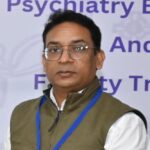Volume 13 Issues 7 July, 2023

Editor, MINDS Newsletter, Department of Psychiatry, All India Institute of Medical Sciences, (AIIMS) Raipur, Chhattisgarh, Indian
Follow me Twitter
Neurodiversity is about acknowledging that each person’s brain is developed uniquely, resulting in differences in abilities and behavioural traits among all people. Neurodiversity in the medical profession is an increasingly recognised and valued aspect of diversity. Neurodiversity refers to the natural variation in human brain function and cognition, including conditions such as autism, ADHD, dyslexia, etc. In recent years, there has been a growing understanding that neurodivergent individuals can bring unique perspectives, skills, and talents to various fields, including medicine1.
Mr X, 45 year male, a psychiatrist by profession. “I recollect myself as an excessively shy child striving to communicate with the outer world through the means acquired by human evolution. Since my initial schooling days, I have had linguistic difficulties, and have a poor sense of time; my teachers have declared me a ‘slow learner.’ There was nothing in me to be noticeable in the class other than my drawing skills in those days.”
Here are some critical points regarding neurodiversity in the medical profession:
- Representation: Neurodivergent individuals, including those with autism and ADHD, are increasingly entering medical school and pursuing careers in healthcare. Efforts to increase representation and support for neurodiverse individuals in the medical profession are ongoing. The efforts should focus on developing an environment that is more accommodating and facilitative so that neurodiverse individuals can flourish to the best of their potential.
- Unique Perspectives: Neurodivergent individuals often possess unique cognitive strengths, such as attention to detail, pattern recognition, and deep focus. These attributes can be valuable in medical practice, research, and innovation.
- Challenges and Accommodations: While neurodivergent individuals may face communication, social interaction, and sensory sensitivities, accommodations and support can enable them to thrive in medical environments. These accommodations may include flexible work arrangements, sensory-friendly spaces, and assistive technologies.
- Advocacy and Awareness: Advocacy organisations and initiatives are working to raise awareness about neurodiversity in the medical profession and to promote inclusive practices. Education and training programs for medical professionals can help foster understanding and acceptance of neurodiverse colleagues and patients.
- Research and Innovation: Embracing neurodiversity in the medical profession can lead to new insights and innovations in patient care, medical research, and healthcare delivery. By harnessing the diverse talents of neurodivergent individuals, medical teams can enhance their problem-solving abilities and improve patient outcomes.
“The difficulties were even clearer when I appeared for a time-bound Indian competitive entrance examination. Fortunately, there were multiple medical entrance examinations based on various patterns in those days, and few suited me. Bluntness in sociality and expressivity cost me in several ways, but perhaps deep observance and understanding of human behaviours helped me survive in medicine. Nevertheless, it remains a day-to-day struggle to be a neurodivergent.”
Neurodiverse people may face many challenges, but they also have several positive characteristics that psychiatrists can build on to enable these individuals to function successfully in educational and work environments.1
Fostering a culture of inclusion and support for neurodiversity in the medical profession can lead to more diverse, equitable, and effective healthcare systems. By recognising and valuing the contributions of neurodivergent individuals, we can create a more inclusive and innovative future for medicine.

